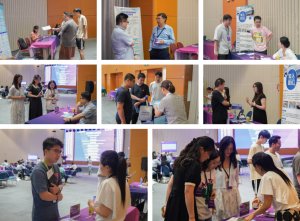September 2025
Full time
Three or four years
Available
Suzhou
XJTLU undergraduate students earn two degrees: an XJTLU degree recognised by the Chinese Ministry of Education and a globally respected University of Liverpool degree.

Knowledge and skills
By the time you graduate from the BA English and Communication Studies, you will have:
- the skills to communicate professionally in English, within the context of language studies in linguistics, literature and translation and interpreting, as well as communication studies in journalism and public relations, digital media and film making
- an understanding of the theories and analytical techniques associated with linguistics, literature, translation and interpreting and communication
- the ability to apply your knowledge and skills to solve practical challenges and problems within the context of journalism and public relations, digital media and film making
- both strong English language skills and a combination of critical and theoretical knowledge
- intellectual, interpersonal and technical skills that are highly valued by employers
English and communication students are especially well placed to develop new perspectives and to transfer skills and knowledge between disciplines.

Tanjun Liu
Programme director
Modules
*Programme modules listed are illustrative only and subject to change. XJTLU students are advised to log in to the e-Bridge Portal to view the effectuated module structure.
Xi’an Jiaotong-Liverpool University offers a wide range of courses in the first year, including English for academic purposes (EAP), mathematics and physics, and humanities and social sciences. Click to learn more.
Core Modules
Global Media Industries
Representation, Diversity and Identity
Audiences and Media Users
Foundations in Film Studies
Introduction to Journalism Studies
Introduction to Digital Media and Communication
Introduction to Literary Studies
Literature in Context
Sounds of English
Introduction to Linguistics: Grammar
History of English
Introduction to Linguistics: Spoken & Written Discourse
AI-Empowered Translation Skills
Introduction to Translation and Interpreting
Core Modules
Multimedia PR Campaigns
Qualitative Research Methods
News Reporting
European Cinema
Digital Media Law and Ethics
Hollywood Cinema
Social Network Analysis
Enlightenment: Literature and Philosophy (1690-1795)
Postcolonial Literature
Language and Society
Language Acquisition
Translation: Theory and Practice
Interpreting
Optional Modules
Multimedia PR Campaigns
Quantitative Research Methods
Hollywood Cinema
Social Network Analysis
Introduction to Visual Communication
Literature and Gender
Jane Austen
Tragedy in the Age of Shakespeare
Modern British Fiction on Page and Screen
The Short Story
Contemporary Western Approaches to Literature
Romanticism: Nature, Mind, and Society (1780-1840)
Language and Media
Bilingualism
Language and Gender
Semantics and Pragmatics
Cognitive Linguistics
Psycholinguistics
Corpus Linguistics
Language Documentation
Syntax
Morphology
Language Studies for Translation
Sight Translation
Translation and AI Technology
Translation and Culture
Translation and Journalism
Literary Translation
Translation and Computation
Core Modules
Chinese Cinema
Cultural and Creative Industries in a Digital Economy
Investigative Journalism
Postmodern Literature (1945-present)
Literature of Modernity (1900-1940)
Analyzing text
Intercultural Communication
Technology-Enhanced Audiovisual Translation
Translation Workshop I
Optional Modules
Final Year Project: Communication Studies
Artificial Intelligence and Big Data in Society
True Stories Told
The City in Films
Film Studies for the Digital Age
Love, Sex and Food in the Digital Age
Health Humanities
Literature: Final Year Project
Gothic Literature on Page and Screen
Climate Change and Literature
Utopia: The History of an Idea
Interpersonal communication in the workplace
Final Year Project
Language and Power
Chinese Linguistics
Language of the Law
Historical Linguistics
Applied Linguistics
Translation and Interpreting: Final Year Project
Conference Interpreting
Translation Workshop II
Translation and Society
This programme offers me the freedom to choose courses from both Applied English program and Communication Studies program. Hence, I am allowed to explore the language, media and culture in this evolving digital world and find my own research interest and career passion.

Zhexuan Sun
Student, BA English and Communication Studies
Careers
Graduates of this programme will be attractive employees in globalised workplaces and may be employed in journalism, broadcasting, advertising or film making. Graduates will also be well prepared for positions including management trainee, professional translator or interpreter, teacher of English as a foreign language and positions in retailing, computing and librarianship. Additionally, the programme provides a solid foundation for postgraduate study in English language, English literature and communications.









Overview
Communications and the media play an increasingly central role in modern society, economics and politics, making English, the global communications language, more important than ever before.
As a student of the BA English and Communication Studies programme, you will have access to modules offered in the Department of Applied Linguistics, Literature, Translation and Interpreting, as well as Department of Media and Communication and School of Film and TV Arts.
The unique level of choice and flexibility available in this programme makes it ideal for both international and domestic students. The programme offers three pathways focusing on language, which are linguistics, literature, and translation and interpreting, and another three pathways on communication studies, which are journalism and public relations, digital media, and film studies. The students can choose one from each three pathways to build their unique learning profile, giving them exceptional advantages for future postgraduate studies or professional development.
Why should I study English and Communication Studies at XJTLU?